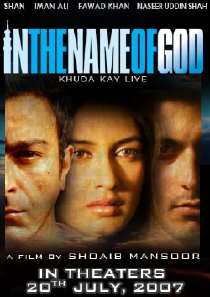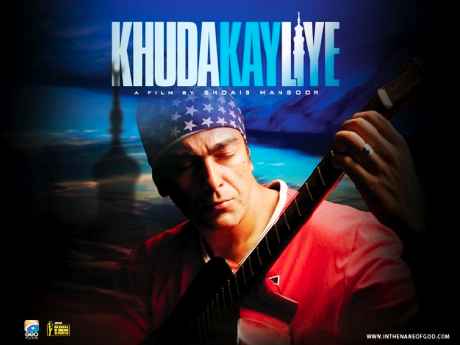(UPDATE: You can view this movie here).
We had a preview of the movie Khuda Ke Liye at ATP where we had posed a question whether Shoaib Mansoor will be able to revive Pakistan cinema? A probable answer comes from myself who recently got chance to see this movie. The record breaking Pakistani film Khuda Ke Liye has become my favorite film overnight- Hollywood inclusive. Or more accurately I should say, that there hasn’t been a film in the past that has moved and affected me in this way.
Given the standing ovation the film is getting in theatres all over Pakistan from rich and poor alike, one can safely say that I am not the only one. For one thing it is a uniquely Pakistani story, which could have only come out of Pakistan. To sum it up, it is about us – the people of Pakistan warts and all- take it or leave it.
The genius of Shoaib Mansoor was never in doubt for those who have seen his videos or for that matter the famous Alpha Bravo Charlie – the TV Drama on Pakistan Army. What I was unprepared for was the depth in his thought and the way he has managed to capture the Pakistani dilemma on screen. Ours is a complex and rich predicament which needs to be captured in all its nuances and appreciated in all its paradoxical colors. KKL did just that.
 I went to the theatre expecting to see the same old liberal v. fundo arguments. There were those, but unlike how these arguments play out in “The Friday Times” and the “Nawai Waqt“, this remarkable film is fully conscious of its Pakistani identity and the strong Islamic component that forms part thereof.
I went to the theatre expecting to see the same old liberal v. fundo arguments. There were those, but unlike how these arguments play out in “The Friday Times” and the “Nawai Waqt“, this remarkable film is fully conscious of its Pakistani identity and the strong Islamic component that forms part thereof.
At the risk of spoiling it for those who haven’t seen it, this is the story of two brothers, Mansoor (played by Shaan) and Sarmad (played by theatre actor/musician Fawad of EP fame) both musicians, brought in a well to do Pakistani family. Mansoor and Sarmad are torn apart by the latter’s increased involvement with a certain Maulana Taheri (based most probably on Maulana Sami ul Haq of JUI-S component of the MMA), who turns the soft spoken Sarmad into full fledge Jehadi.
Things are complicated when the brothers’ cousin Mary arrives from London to spend a few days with them, only to discover that she has been tricked by her father into coming to Pakistan to avoid her marrying her Non-Muslim boyfriend Dave. Meanwhile Mansoor leaves for Chicago to enrol at the “School of Music” there. In an epic that switches from London to Lahore to Waziristan to Nangahar Afghanistan to Chicago, these ordinary Pakistanis are increasingly faced with both internal and external conflict. And then there is September 11.
Shoaib Mansoor does not miss a beat, he does not leave any stones unturned. While all characters have more or less the same significance in this plot, it is Mansoor who is at the centre of it: Mansoor who is a proud Pakistani and secure in his Muslim identity, Mansoor who warns Sarmad against extremism, Mansoor who puts the best Muslim and Pakistani foot forward, Mansoor who is abducted by FBI in the middle of the night and beaten and tortured to a pulp, humiliated and abused for being a Pakistani and a Muslim. He is the contrast to Sher Shah and Maulana Taheri. But there are contrasts on the other side as well… Jenny who loves Mansoor for being Mansoor, his classmates who spontaneously join in when Mansoor performs his “music from Pakistan”, his African American professor… all stand in contrast to the American torturers of Mansoor.
The dialogue reaches a fever pitch in a court room in Lahore, where Mary is engaged in a prolonged legal battle. Enter the Bollywood star Naseeruddin Shah. He plays the character of a long bearded progressive Islamic scholar (probably based on Maulana Ahmed Javed and Allama Javed Ahmed Ghamidi of Lahore). In what would be the localised version of “Inherit the wind” Courtroom drama, he engages Maulana Taheri and his coterie in an argument on Islamic law and Islamic dress code.
“There is beard in religion, but no religion in beard,”
declares Shah, adding that
“Two men who did the greatest service to Islam in Pakistan, Mahomed Ali Jinnah and Allama Iqbal, did so without a beard and out of the so called Islamic dresscode, in western dress.”
It was on this line that the entire hall filled with applause. Islam – the universal faith – has no uniform. This lays the stage for the final scene- the most poignant scene of the movie, filmed in Lahore’s beautiful Wazir Khan Mosque– the scene which once again made a Muslim out of me. I’ll let you watch it yourself to understand what I am talking about.
As for the film itself, there seem to be a few technical glitches earlier on but they are easily forgotten. Iman Ali‘s performance as Mary or Maryam in the beginning is annoying and one finds her concocted British accent a little annoying at first. However it grows on you and one discovers the fullness of her effort- which is by far the best I have come across by a Pakistani actress. As for the music, those of you who have only heard Bandaya, you are in for a surprise. The film is as a whole an incredible musical experience. What is more is that you discover how aptly Shoaib Mansoor has placed his music in the various scenes. Indeed, driving back from Lahore on the motorway, I could recount/recollect every scene just by listening to the soundtrack.
This is a movie no Pakistani can afford to miss.





















































“To fight fire with fire ”
In other words, mullah against mullah….thats the only way to do it…..reform from within.
“Why did Shoaib Mansoor choose to bring an older and wiser Mullah to come and set things straight?”
To fight fire with fire :D
Shoaib knows what sort of stereotypical appearance can convince people in matter of their faith.
Another point, someone said in an earlier post that we dont need mullahs.
Why did Shoaib Mansoor choose to bring an older and wiser Mullah to come and set things straight?
Salam Alaikum,
The movie Khuda ke liye oozes with positivity that is being overlooked by people who feel threatened for their deen and their way of life.
The first thing I’d like to emphasize is that all the controversial things, including musical instruments, muslim women marrying non-muslim men, Dawood Alayh salam’s songs etc etc have been topics of discussion in the classical islamic discourse for centuries. It is very very common in traditional islam to have differing opinions. Someone posted earlier “do you follow shariah 100%”. That is technically impossible. The fact of the matter is that shariah itself is not absolute. Classical sunni scholars have divided shariah in several parts, aqeedah, fiqh, tassawuf, maqasid etc. These parts of shariah have different schools of thought in sunni islam which have always disagreed on many things, hence, DIFFERENT schools of thought. There are 3 schools of aqeedah(At-hari, Ash’ari, Mathuridi), four schools of fiqh(Hanafi, Maliki, Shafi’i, Hanbali) and several different turuqat for authentic tassawwuf.
Differences arose when islam expanded into differnt parts of the world. The concept of Urf(local customs) was established to make the higher ideals of islam(tawheed, ibadaat, ethics, adaab, social justice etc) embed into the local customs of peoples of different regions. In classical Islam, the higher ideals have always been emphasized much more than lesser ahkamaat(beard, non-silk garments etc), which are nonetheless, ahkamaat.
Therefore please try to understand that the topics of contention in this movie arise out of the growth and expansion of traditional islam and not RAND or the very very stupid enlightened moderation movement.
Secondly, muslims and pakistanis in general always seem to have a very negative outlook. There’s a lot of things in this movie that very positive and essential for pakistani islamic society and the pakistani islamic culture. In an age when the kabaa-ir are rampant in our communities and people are getting more and more de-sensitized about such things this movie re-affirms that stealing, drinking, fornication and gambling are indeed evil acts. Its also important to note that while its now a norm in pakistani film and art to sell the bodies of women for greater audience(look no further than the next atif aslam video) shoaib mansoor chooses not show such things. Thats what a true muslim would do. Just like Junaid Jamshed says, be-hayaee mein hamari izzat nahi hai.
Finally, the film also proves that Pakistanis love Islam and they WANT to be good muslims. People just need an avenue that gets shut down by people like the Taliban Mullah, but there’s hope from people like Naseer Uddin Shah character who was also, by the way, a long bearded, five time praying, khutbah giving MULLAH!
In the end, Mary is a changed person. She realizes that the kinda life she lead in England was not fitting to her needs, and was only a byproduct of the negative environment her father raised her in. She then becomes Mariam and decides to make meaning out of her life by teaching young girls in the Afghan village. Sarmad returns to playing music, but keeps his beard for the love of his prophet and continues to pray and give the beautiful adhan.
This movie is call for pakistanis to escape westernization and escape arabization and return the roots of pakistani culture and return to the creed of Islam and establish a balanced Pakistani Islamic society.
May Allah reward Shoaib Mansoor for his apparent sincerity and passion for this cause.
May Allah reward the callers to peace and justice.
May Allah guide all of us away from munkar.
May Allah bless all of the struggling muslims and give them victory over their conquerors.
May Allah bless all of us.
Ameen.
wsalam alaikum
I saw the movie few days back and really liked it.It tells us clearly that these “Mullas” have made Islam a complicated religion,otherwise Islam is the most clear religion and has most human rights,esp for woman….i really liked it…Congrats to Shoaib Mansoor,well done and keep it up…